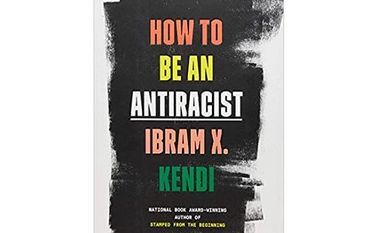It’s commonplace to hear people deny they are racist, adding by way of proof that some of their best friends are non-white, or that their opposition to racism is well known. “Moi? Racist? Nonsense”.
But is being “non-racist” the same thing as being “anti-racist”? “NO!”, screams the author of this book arguing that not only are they not the same thing but such protests and denials are in fact a “mask” to conceal covert racism.
“Denial is the heartbeat of racism, beating across ideologies, races, and nations,” he writes pointing out that the claim that one is “not racist” signifies “neutrality”. What it really means is : “I’m not a racist, but neither am I aggressively against racism,” he says. He sees it as equating neutrality with anti-racism whereas “there is no neutrality in the racism struggle”.
“The opposite of ‘racist’ isn’t ‘non-racist’. It’s ‘anti-racist’,” according to him. And it requires one to to be pro-active in engaging with the causes of racism. All of us, the author alleged, are somehow inadvertently complicit in perpetuating racism by assuming that we are anti-racist just because we are not overtly racist.
His catalogue of “suspects” includes his own parent — a part of a “new Black middle class” which believes that Blacks themselves are responsible for their backwardness.
“They fed me the mantra that education and hard work would uplift them, just as it had uplifted them...My parents...were susceptible to the racist idea that it was laziness that kept Black people down.”
Kendi doesn’t spare himself either and recalls with shame and embarrassment what he describes as the “racist speech” he gave as a schoolboy in which he criticised Black youth for their lifestyle, and lack of aspiration.
“I didn’t realise that to say something is wrong about a racial group is to say something is inferior about that racial group ... I thought I was serving my people, when in fact I was serving up racist ideas about my people to my people,” writes the author, a prominent Black American academic and anti-race campaigner whose ideas about racism were shaped by his experience of growing up in racially-charged Reaganite America.
The book has won praise on both sides of the Atlantic for challenging some of our commonly accepted everyday assumptions about racism. The New York Times hailed it as the “most courageous book to date on the problem of race in the Western mind”. This side of the pond, in Britain, Observer praised it for offering a “way out from the tangled disingenuousness of mainstream narratives around racism”.
Those familiar with Mr Kendi’s work say it lives up to the reputation he established on the back of his award-winning Stamped from the Beginning: The Definitive History of Racist Ideas in America, which questioned the “unwitting racism” of some of America’s most respected progressive intellectuals.
So, is the hype justified? Yes, if you like good simplistic polemic; but no if you’re looking for a dispassionate analysis of a complex problem. It’s a sweeping in-your-face indictment of all liberals, however well-meaning and irrespective of their race or colour barring those who — like its author — are activist campaigners.
To show you’re not racist, you must wear your anti-racism on your sleeves, call out any hint of racism, shout out from rooftops if you face racial discrimination. Silence on any ground, however seemingly justified, is inexcusable. It amounts to complicity.
Lately, we have heard similar arguments in relation to the #Me Too Movement: That victims of historical sexual abuse who remained silent for whatever reason — fear of being sacked, not being taken seriously, accused of making it up — were complicit in their own abuse.
Mr Kendi’s is effectively a fundamentalist’s charter: Either you’re with us in the struggle against racism in which case you must come out on the streets and stand up to be counted; or you’re faking it. There’s a lot of hair-splitting around definitions but he insists definitions matter because they’re often vague and don’t convey the real meaning of racism. Expressions like “institutional racism”, “structural racism”, and “systemic racism” , he claims, are “redundant”.
“We become unconscious to racist policymakers and policies as we lash out angrily at the abstract bogeyman of the ‘system’...Racism itself is institutional, structural, and systemic,” he argues.
The best part of the book is its account of the history of slavery and racism; and Mr Kendi’s argument that the cause of racism is not ignorance — but the dominant classes’ and policy-makers’ “self-interest”.
He ends on a hopeful note that “we can survive metastatic racism” just as people survive cancer. And they include himself, his wife, and his mother all of whom were at different times diagnosed with forms of cancer. But they all beat it. He describes racism as “one of the fastest-spreading and most fatal cancers humanity has ever known”, but believes it’s important to live in hope because “once we lose hope, we’re guaranteed to lose”. The book is high on passion, but offers little new to chew on.
- How To Be An Anti-Racist
- Ibram X Kendi
- The Bodley Head, 305 pages, £16.99
Unlock 30+ premium stories daily hand-picked by our editors, across devices on browser and app.
Pick your 5 favourite companies, get a daily email with all news updates on them.
Full access to our intuitive epaper - clip, save, share articles from any device; newspaper archives from 2006.
Preferential invites to Business Standard events.
Curated newsletters on markets, personal finance, policy & politics, start-ups, technology, and more.
)